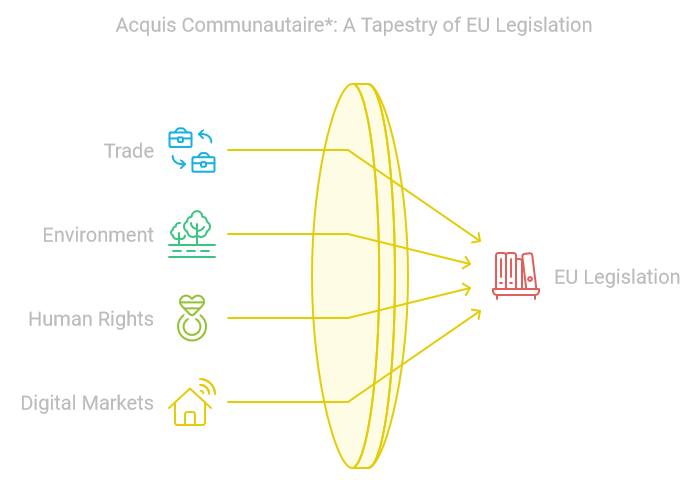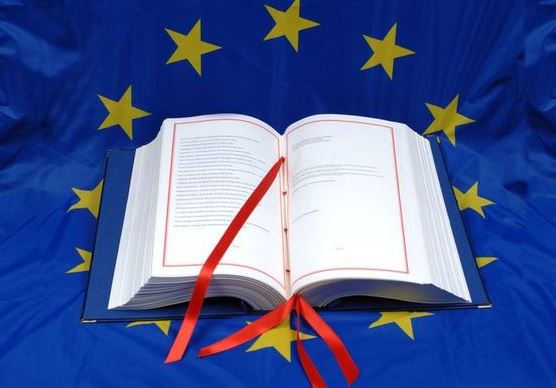The acquis communautaire refers to the body of common rights and obligations that are binding on all European Union (EU) member states. It consists of EU treaties, legislation, court rulings, and other legal acts.
As for its length, it is immense, encompassing over 170,000 pages of legal text as of 2023. This body of law continues to grow, as new regulations and directives are adopted. It covers areas like economic policy, trade, agriculture, justice, and more, requiring any country that wants to join the EU to adopt and implement these rules.
The acquis communautaire is a central concept in the European Union’s legal system, representing the collective body of EU laws and regulations that all member states must adhere to. This comprehensive framework governs various aspects of EU integration, from trade and the environment to human rights and digital markets. Understanding the length and scope of the acquis is crucial, especially for member states and countries aspiring to join the EU. The sheer volume of legislation they must adopt and integrate into national law is substantial, and its constant growth poses significant challenges for both existing and prospective members.
What is the Acquis Communautaire?
The acquis communautaire refers to the accumulated legislation, legal acts, and court decisions that form the foundation of the European Union’s legal framework. This vast collection of legal norms includes treaties, EU directives, regulations, and decisions made by EU institutions, as well as international agreements. Its primary role is to ensure consistency and uniformity in the application of laws across all EU member states, creating a harmonized legal environment that facilitates cooperation, trade, and governance across the region.
At its core, the acquis encompasses several components:
- Treaties: The founding documents of the EU and its institutions.
- Legislation: Regulations, directives, and decisions passed by EU bodies.
- Court Rulings: Judgments from the European Court of Justice that interpret and apply EU laws.
- International Agreements: Treaties and accords between the EU and non-EU countries or organizations.
Historical Context: The Growth of the Acquis Communautaire
In the early 2000s, the acquis communautaire consisted of roughly 80,000 to 83,000 pages. Since then, its size has expanded significantly due to the evolving nature of the EU. Several factors have contributed to this growth:
- EU Expansion: As more countries joined the EU, new areas of law were added, and existing laws were adapted to accommodate diverse national contexts.
- Legislative Processes: The EU’s legislative bodies have passed numerous new laws to address emerging challenges in areas such as digital technology, climate change, and human rights.
This growth reflects the EU’s increasing legislative complexity and its ongoing efforts to create a cohesive legal system that meets the needs of its member states.

The Current Size of the Acquis Communautaire
By 2020, the acquis communautaire had grown to an astounding 170,000 pages, illustrating the vast scope of European Union legislation. This growth is not simply a matter of increasing volume; it reflects the EU’s effort to regulate and harmonize a wide range of sectors. The acquis covers areas such as:
- Trade: Laws governing the single market, customs regulations, and competition rules.
- Environment: Regulations aimed at addressing climate change, environmental protection, and sustainable development.
- Human Rights: Standards for fundamental rights, equality, and the rule of law.
- Digital Markets: Laws governing data protection, digital services, and the digital economy.
The expansion of the acquis is a direct result of the increasing complexity of EU governance. As the EU has grown both in size and scope, it has had to address emerging issues in global trade, environmental sustainability, technological advancement, and human rights. The result is a constantly evolving legal framework that attempts to balance the needs of a diverse set of member states, while ensuring a level playing field across the union.
Challenges of the Expanding Acquis Communautaire
The sheer size of the acquis communautaire presents significant challenges for both aspiring and current EU members. For countries seeking to join the EU, one of the key requirements is adopting and integrating the entire acquis into their national legal systems. This can be a daunting task for new members, particularly those with legal frameworks that differ significantly from EU norms. It requires substantial legal reforms, resources, and time to ensure full compliance.
Current EU member states also face difficulties in keeping up with the expanding acquis. As new laws are introduced and existing ones are revised, member states must continuously adapt their national laws and regulatory frameworks. This process requires coordination, expertise, and administrative capacity to ensure that EU laws are implemented effectively at the national level. For many, this constant legal evolution creates a burden of compliance, as they struggle to stay aligned with the growing legal complexities of the union.

Efforts to Simplify the Acquis Communautaire
Recognizing the challenges posed by the rapidly expanding acquis communautaire, several EU officials have attempted to simplify and reduce its size. One notable figure in this effort was former European Commission President Romano Prodi, who, during his tenure, acknowledged the need for a more streamlined legislative framework. Prodi and others advocated for initiatives aimed at reducing regulatory burdens, cutting unnecessary legislation, and consolidating existing laws where possible.
Despite these efforts, attempts to simplify the acquis have been largely unsuccessful. One reason is the inherent complexity of governing a union of diverse member states, each with its own unique legal and regulatory challenges. As the EU has expanded and new sectors have required regulation, the need for comprehensive laws has outweighed efforts to reduce the acquis. Additionally, political disagreements among member states on which laws to remove or simplify have slowed down progress, making large-scale reforms difficult to achieve.
Conclusion
The vast length of the acquis communautaire is both a reflection of the EU’s commitment to harmonized governance and a significant challenge for both current and aspiring member states. For countries hoping to join the EU, the requirement to adopt this enormous body of law into their national systems is a demanding process. Similarly, existing members must continuously adapt their legal frameworks to keep up with the ever-growing acquis.
As EU law continues to evolve, the acquis communautaire is expected to expand further, driven by new legislative needs in areas such as digital markets, environmental sustainability, and global trade. While efforts to simplify the acquis have been largely unsuccessful, the EU remains committed to refining its legal framework, balancing the need for comprehensive regulation with the realities of administrative and legal complexity.
FAQ: Understanding the Acquis Communautaire
1. What is the acquis communautaire?
The acquis communautaire refers to the entire body of European Union (EU) laws and regulations that member states must adopt and adhere to. It includes treaties, legislation, court rulings, and international agreements that form the legal framework of the EU.
2. How long is the acquis communautaire?
As of 2020, the acquis communautaire was estimated to be approximately 170,000 pages long. It has grown significantly from around 80,000 pages in the early 2000s due to the expansion of the EU and the creation of new legislation.
3. What sectors are covered by the acquis communautaire?
The acquis covers a wide range of sectors, including:
- Trade and competition laws
- Environmental protection and climate change regulations
- Human rights and equality standards
- Digital markets and data protection
4. Why does the acquis communautaire keep growing?
The acquis continues to grow due to the EU’s expansion, the need to address new challenges in sectors like technology and climate change, and the ongoing legislative processes aimed at harmonizing laws across member states. Each new law or regulation adds to the length of the acquis.
5. Why is the acquis communautaire important for countries wishing to join the EU?
For aspiring EU member states, adopting the acquis communautaire is a crucial part of the accession process. These countries must incorporate the entire body of EU laws into their national legal systems, ensuring alignment with EU standards before they can be granted membership.
6. Have there been any efforts to simplify the acquis communautaire?
Yes, there have been several attempts to simplify the acquis, including efforts by EU officials like former European Commission President Romano Prodi. However, these efforts have largely been unsuccessful due to the complexity of EU governance and disagreements among member states on which laws to simplify or remove.
7. What challenges do current EU member states face regarding the acquis communautaire?
Existing EU member states must continuously update their national laws to comply with the growing acquis communautaire. This requires administrative and legal resources, as well as coordination between national and EU institutions to ensure proper implementation of new and revised laws.
8. How does the acquis communautaire affect everyday life in EU member states?
The acquis affects various aspects of daily life, from trade and environmental policies to consumer protection and human rights. It ensures consistency in laws across member states, promoting smoother trade, safeguarding citizens’ rights, and addressing shared challenges like climate change and digital security.




